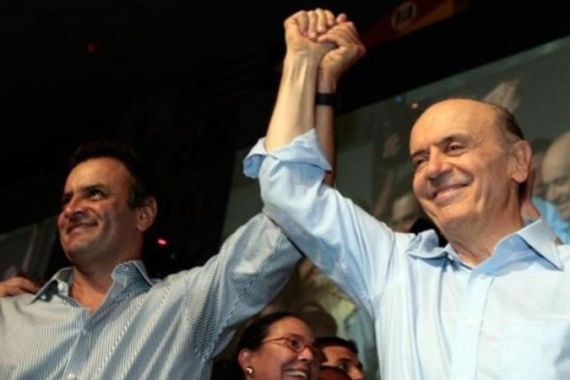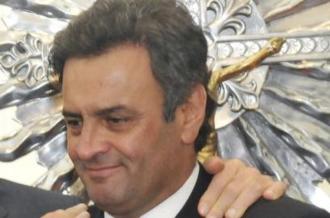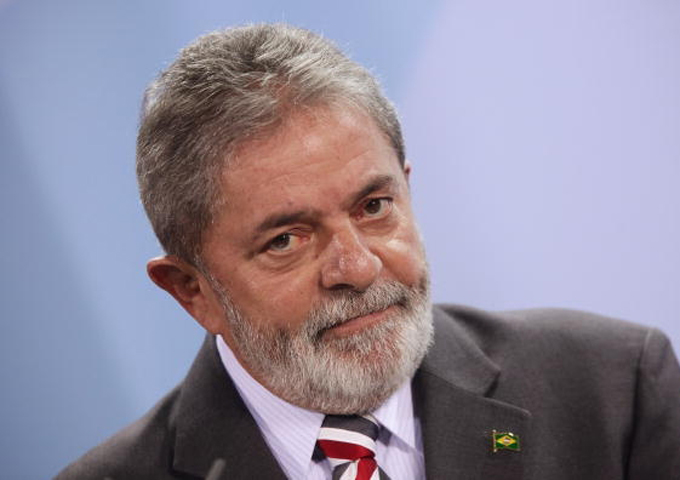Analysis: Brazil’s next president will be…
With an election set for next year, unofficial campaigning has already begun in the South American powerhouse.

Sao Paulo, Brazil – There’s a case to be made that no country has lived through as much radical and fundamental positive change in the past 10 years as Brazil.
There has also been an evolution – of sorts – in what Brazilians want and need out of their president.
A decade ago Brazil was a country looking for a charismatic, larger-than-life figure who would lift millions from poverty, take the country to new economic heights, and rattle the cages of the world to take notice of the South American giant.
In that sense, former President Luiz Inacio Lula da Silva delivered beyond anybody’s wildest imaginations. He was the right person, at the right time, in the right job.
But today, the country seems to be in a different place. Major advances are being made in the battle against poverty and Brazil no longer needs a cheerleader-president. Brazilians now seem more interested in an administrator-president to make sure their house is in order, and the fundamentals are in place as they sober up from the wild party of the Lula years.
That desire explains much of current President Dilma Rousseff’s success, if the polls are to be believed.
But next year will be a test for Brazil. The 2014 World Cup will be held in June and July, and just 84 days after the final in Rio de Janeiro, the country will hold presidential elections.
Unofficial campaigning has already begun, and there are arguably five key people to watch in next year’s crucial vote.
Dilma Rousseff
Polls indicate her personal approval ratings are in the mid to high 70s, while the percentage of Brazilians who approve of the job she is doing as president hovers in the high 50s to mid 60s.
For the head of state of Latin America’s largest democracy, those numbers are rock solid by any estimation. If the election were held today, she would win easily, and it’s conceivable she would gain on the 56 percent of the vote she received in 2010.
Rousseff has lost no support with her working class base, and there are indications her no-nonsense management style has appealed to a portion of people in the middle class who didn’t vote for her the first time around. There are, of course, problems in Brazil – the economy is struggling to regain speed, and there are persistent political corruption, infrastructure, and public primary education issues – but the majority of Brazilians seems to believe Rousseff is tackling these problems with determination. That is her image within Brazil, and it has stuck. Rousseff wins no awards for style, but she’s already won over many of Brazilians with her substance.
 |
| Brazil’s President Dilma Rousseff is seen as a competent administrator but many believe she lacks charisma [Reuters] |
Strengths: She has fostered an image as a clean political operator unafraid to dump buckets of chlorine into the corrupt waters that are historically associated with politics in Brasilia. When she wants to, she can give a meaningful and powerful speech – like she did in 2011 when she was the first women to give the opening address at the UN General Assembly. It was arguably her best speech as president.
She’s also privileged to have the power of the Workers Party (PT) at her disposal. The PT has the ability to flip a switch and mobilise tens of millions of supporters on her behalf. Politics in Brazil – especially at the presidential level – is a game of jockeying for political alliances with rival parties, and the Workers Party has it mastered.
Weaknesses: She still doesn’t inspire deep passions within a lot of her base. In other stops as president, she often fails to connect with even her most ardent supporters. On the left, there are a fair amount of interest groups who feel she has not done enough to maintain Lula’s more progressive political posturing of Brazil. There are also those who say she’s been too much of a compromiser, and too sympathetic to big business.
The chance she will run for re-election? 95 percent. It would take a major, unexpected event for her not to run.
Aecio Neves
The youthful senator has been groomed to be president and has family connections to the country’s political class. He is the grandson of Tancredo Neves, the first elected president after the fall of the military dictatorship in 1985. The elder Neves died of health complications before taking office.
Aecio Neves’ home state of Minas Gerais, where he served as a popular governor for more than 7 years, is second only to Sao Paulo in terms of importance in presidential elections. One out of every ten votes cast for president is from a voter in Minas Gerais, about 15 million voters in all.
The state capital, Belo Horizonte, is Brazil’s third largest capital and the state itself is the country’s third wealthiest. But Minas, where Neves has a powerful political operation, is also diverse and considered a “swing state”.
Conventional wisdom is that becoming president of Brazil requires a strong showing in Minas Gerais, and it’s likely Neves already has that part of the election in the bag. In 2006 he garnered 77 percent of the vote when he ran for re-election as governor. Rousseff, on the other hand, easily won Minas Gerais with 58 percent in 2010. If it comes down to Rousseff and Neves, Minas Gerais will be a hard-fought political battleground like no other in Brazil’s recent history.
 |
| Aecio Neves, 52, was a popular former governor of Minas Gerais state, one of the Brazil’s most populous regions [Reuters] |
Strengths: Neves’ youth (he’s 52) and charisma could position him as a fresh face for Brazil.
He also has a record to run on, known for his inventive “management shock” governance strategy meant to make government run more efficiently. Neves has also emerged in recent years as a national political figure, and a leader of the powerful PSDB – Brazil’s largest opposition party. The man is a legitimate political heavyweight who is about to get his first shot at a title.
Weaknesses: His party, the PSDB, is a strength, but also a weakness right now. They’re deeply fractured between the new, emerging wing of the party that Neves represents, and the old guard, led by Jose Serra, a twice defeated presidential candidate.
The party has furthermore failed to articulate a credible vision to counter the Workers Party/Lula/Rousseff model that resonates with the masses. Neves also has a reputation as being somewhat of a playboy who likes fast cars and jetting around the social scene with Brazilian supermodels. In 2011 he was pulled over by police in a posh neighborhood of Rio for driving with an expired driver’s license. Fairly minor episodes could make party elders wonder whether his political messages could be overshadowed by his private life. For his part, in the past couple years he’s toned it down considerably and kept his private life out of the news.
Chances he’ll run: About 90 percent – he’s the PSBD’s best hope right now, and it’s naturally his turn in the spotlight (He sat out the 2010 race so as not be a distraction from his party’s candidate, Serra). It’s unlikely the Serra wing of the party will be able to provide a strong enough alternative next year. It’s Neves’ party now, and he’s closely aligning himself with Fernando Henrique Cardoso, his party’s elder statesmen and the last politician to have beaten Lula in an election.
Marina Silva
Silva is probably the hottest political commodity in Brazil at this moment. The senator, former environmental minister under Lula, and world-renowned Amazon activist brings an air of authenticity to the political scene. And she’s also tried and tested: She startled the political establishment when she garnered 19.6 million votes in the first round of voting in the 2010 presidential election despite running a shoestring campaign in the underfunded Green Party.
This past weekend she launched a new political party with a focus on grassroots involvement (no campaign contributions from tobacco, firearms, or alcoholic beverage companies, she says). Silva is a favorite among many in Brazil’s leftist inteligenicia class of artists, actors and filmmakers.
 |
| Marina Silva won more than 19 million votes when she ran for the Green Party ion the last election [Reuters] |
Strengths: From a purely political standpoint, she can personally connect with working class workers better than anybody in Brazil not named Lula. She is also strongly Evangelical, a growing political force in Brazil that makes up nearly 22 percent of the population. But most importantly, she has proven she can almost single handedly mobilise a national movement like she did in 2010 to garner millions of votes – far more than most people predicted. That is a rare political ability. Anybody who dismisses her does so at their own risk.
Weaknesses: Her new political party will struggle to put together the network needed to compete in the game of national political alliances in 2014. She’s also a candidate strong in speaking about inequality and environment issues, but weak when the focus shifts to the minutiae of economics, a serious weakness for someone hoping to lead the world’s sixth largest economy. She is not shy about talking about how her faith interconnects with her views on government, a likely turnoff to secular or non-Evangelical voters. The general consensus is that she likely will struggle to get 19 million votes this time around. She has proven doubters wrong in the past, but can she do it again?
Chances she’ll run: About 85 percent.
Eduardo Campos
The two-term governor of the northeast Brazilian state of Pernambuco has become a media darling of sorts, being profiled in everything from glossy Brazilian newsweeklies to the Economist magazine as a rising political star. He’s popular back in his home state (population 9 million), and is seen as a cut-throat and savvy political operator. He has deep alliances that date back more than a decade on the political left, but has also fostered friendships on the right as well. He takes credit for much of the economic prosperity his state has seen in recent years.
Strengths: He’s fresh and different on the national political stage, and he has potential crossover appeal on the political right and left. He has aroused the curiosity of the centre-right, who see him as someone who can perhaps beat the left at their own game. His home state, Pernambuco, is a Lula/Rousseff stronghold, so he is one of the few national candidates who has the potential to cut deep into Rousseff’s base.
Campos was re-elected governor in 2010 with 82 percent of the vote. Rousseff, in contrast, won Pernambuco state in 2010 with 75 percent of the vote. He’s proven he can get attention from a Brazilian media looking for a new political storyline, given the unusually high media coverage he’s been generating in Brazil.
Weaknesses: The current phenomenon of Campos has some similarities to the campaign of Texas Governor Rick Perry during the 2011 Republican primary in the US.
Just like Perry, Campos is seen as a dominate local political figure with a potential wider, national appeal. But Perry could never break out, and he crashed and burned badly on the national stage quite fast.
Campos has to prove he is something more than a regional political star, and avoid the same fate as Perry. Campos’ biggest challenge will be matching the high expectations that have been set. Despite all media attention, most Brazilians simply don’t know much about the guy. And his iron-fist leadership in his home state, where there is almost no political dissent, likely won’t play well at the national level where he’ll be under much more scrutiny than he has been to date.
Chances he’ll run: About 30 percent. He says he’ll decide later this year. He’s keeping all his doors open right now. It seems that if he doesn’t think he can gain enough votes to get into a second round runoff, he’ll probably sit it out and aim for 2018. If he does run and pose a serious challenge Rousseff, the Workers Party machine will unload on him, and it will be tough to survive politically.
Luiz Inacio Lula da Silva
He is arguably the most popular political figure in Brazilian politics ever. He oversaw the country during historic growth, and record levels of poverty reduction. Lula is fully recovered from cancer treatment, and he’s back on the political stage. No politician in the country even comes close to his power of persuasion.
Strengths: Lula can single-handedly deliver tens of millions of votes to his chosen candidate. It’s that simple. And Rousseff remains his president now just as much as in 2010.
 |
| Former President Luiz Inacio Lula da Silva is arguably the most popular figures in Brazil’s political history [GALLO/GETTY] |
Weaknesses: 2014 will be a test of his staying power. In the last 3 presidential election cycles, he’s come out victorious against the PSDB – his main rival party. But how long can the glow of Lula’s presidency last – and more importantly, will it rub off on his political protégés?
Chances he’ll run: The constitution says he can run again for a third term (just not consecutive). Conspiracy theorists long speculated Rousseff was just his place holder until he could return to the presidency in 2014. Lula himself has left the door (slightly) open, and I suspect that if there was a major rupture in Rousseff’s administration that threatened a second term, he would step in and run to avoid the opposition from gaining power.
But the chances of this now seem miniscule, probably around 5 percent. But since politics is the man’s life and he’s proven to be better than anybody at it, don’t expect him to fade quietly off into the sunset. He’ll play political king maker as long as he wants to.
As for Rousseff, any objective look at the mood of the Brazilian electorate and the state of play of presidential politics can only double back to a simple conclusion: As it stands right now, most Brazilians seem to think she is the right person.
It’s up to Neves, Marina Silva, and maybe Campos and others to try to convince the nation they’re wrong. There’s still plenty of time. But they have a very steep hill to climb.
Follow Gabriel Elizondo on Twitter: @elizondogabriel